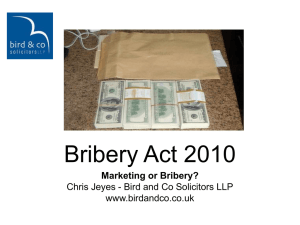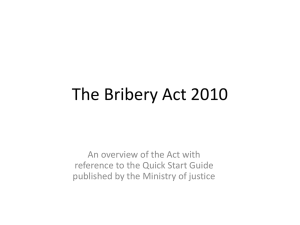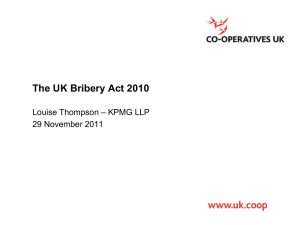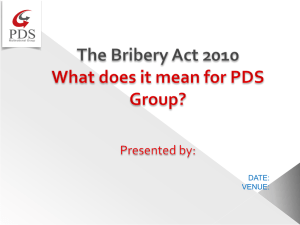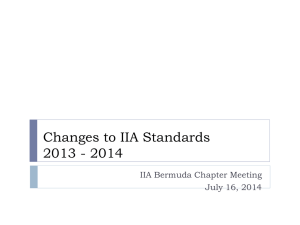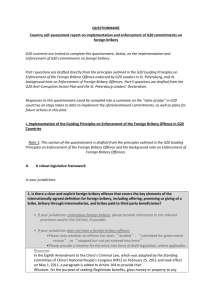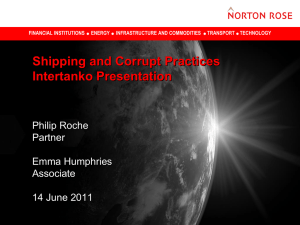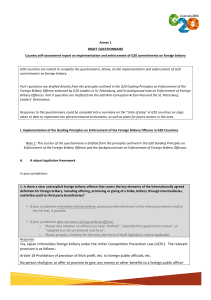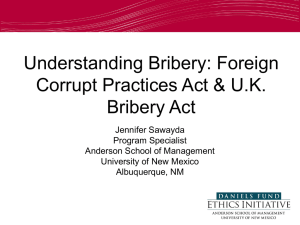Foreign Bribery Frameworks self-assessment - Indonesia
advertisement
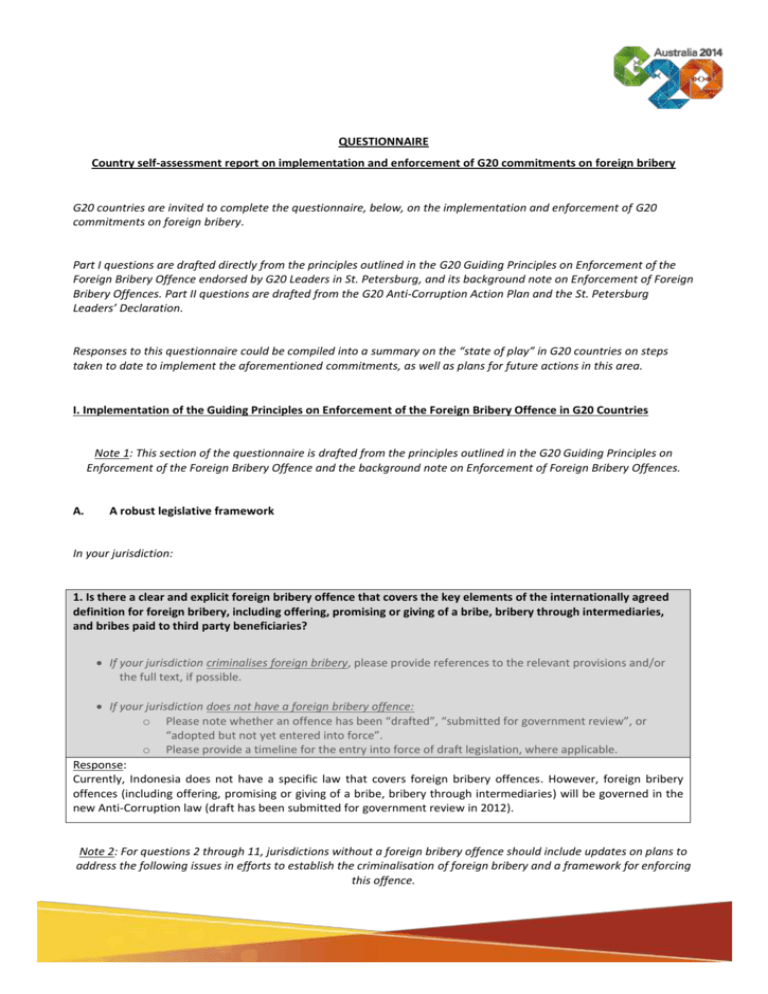
QUESTIONNAIRE Country self-assessment report on implementation and enforcement of G20 commitments on foreign bribery G20 countries are invited to complete the questionnaire, below, on the implementation and enforcement of G20 commitments on foreign bribery. Part I questions are drafted directly from the principles outlined in the G20 Guiding Principles on Enforcement of the Foreign Bribery Offence endorsed by G20 Leaders in St. Petersburg, and its background note on Enforcement of Foreign Bribery Offences. Part II questions are drafted from the G20 Anti-Corruption Action Plan and the St. Petersburg Leaders’ Declaration. Responses to this questionnaire could be compiled into a summary on the “state of play” in G20 countries on steps taken to date to implement the aforementioned commitments, as well as plans for future actions in this area. I. Implementation of the Guiding Principles on Enforcement of the Foreign Bribery Offence in G20 Countries Note 1: This section of the questionnaire is drafted from the principles outlined in the G20 Guiding Principles on Enforcement of the Foreign Bribery Offence and the background note on Enforcement of Foreign Bribery Offences. A. A robust legislative framework In your jurisdiction: 1. Is there a clear and explicit foreign bribery offence that covers the key elements of the internationally agreed definition for foreign bribery, including offering, promising or giving of a bribe, bribery through intermediaries, and bribes paid to third party beneficiaries? If your jurisdiction criminalises foreign bribery, please provide references to the relevant provisions and/or the full text, if possible. If your jurisdiction does not have a foreign bribery offence: o Please note whether an offence has been “drafted”, “submitted for government review”, or “adopted but not yet entered into force”. o Please provide a timeline for the entry into force of draft legislation, where applicable. Response: Currently, Indonesia does not have a specific law that covers foreign bribery offences. However, foreign bribery offences (including offering, promising or giving of a bribe, bribery through intermediaries) will be governed in the new Anti-Corruption law (draft has been submitted for government review in 2012). Note 2: For questions 2 through 11, jurisdictions without a foreign bribery offence should include updates on plans to address the following issues in efforts to establish the criminalisation of foreign bribery and a framework for enforcing this offence. 2. What is the statute of limitations for investigating and prosecuting foreign bribery? Please indicate the criteria for suspension, interruption or extension of the statute of limitations? Response: In the draft new Anti-Corruption Law, the statute of limitation of investigating and prosecuting foreign bribery is 18 years, similar with other corruption offences. 3. Please describe the form of jurisdiction available over the foreign bribery offence (i.e. territorial or nationality jurisdiction). Response: According to the Indonesia Criminal Code, the jurisdiction of criminal law refers to territorial and nationality based approaches. Hence, the jurisdiction of the draft new Anti-Corruption Law over foreign bribery offence would be according to territorial and nationality approaches as well. Law enforcement authorities have the authority to investigate and prosecute: 1. 2. 3. 4. Indonesian entities (individuals and/or corporations) who bribe foreign public officials and/or international organization officials in Indonesia or somewhere else; Non Indonesian entities (individuals and/or corporations) who bribe foreign public officials and/or international organization officials in Indonesia; Foreign public officials and/or International organization officials who receive bribe in Indonesia; Anyone who provide assistance to the commission of an act of corruption, including foreign bribery. 4. Please indicate whether your jurisdiction has a corporate liability regime for the offence of foreign bribery. If your jurisdiction does not have a corporate liability regime for the offence of foreign bribery, please provide a timeline for implementation of corporate liability. Response: The draft new Anti-Corruption Law will have the corporate liability regime for foreign bribery offences. Corporation would be liable if the offences: 1. 2. 3. 4. Conducted or commanded by the directing mind and will of the corporations; Conducted to fulfill the intention and the objective of the corporation; Conducted in accordance with the function of the offenders or the commander; Conducted to benefit the corporations. 5(a) Please describe the sanctions and confiscation measures available for natural and legal persons for the crime of foreign bribery. 5(b) Please provide the number of criminal, administrative, and civil cases of foreign bribery that have resulted in a final disposition, and indicate (i) how many of these cases have resulted in a criminal conviction or acquittal, or similar findings under an administrative or civil procedure, and (ii) the number of natural and legal persons who have been convicted or otherwise sanctioned. Where possible, please provide references to the relevant provisions and/or the full text, if possible. Response: The draft new Anti-Corruption law has regulated bribery that involves public officials, foreign public officials and International organization officials. The draft new on Anti-Corruption Law does not only criminalize active and passive bribery involving foreign public officials and international organization officials. The draft new law also provides sanctions concerning: 1. 2. Indonesian entities (individuals or corporations) who bribe foreign public officials and/or international organization officials; and Foreign public officials or international organization officials who receive bribe within the jurisdiction of Republic of Indonesia. Moreover, the draft new law provides sanction for foreign public officials or international organization officials who commit extortion and embezzlement. The draft law also criminalizes attempting to commit, aiding or abetting, or being accessory to the commission of an act of corruption with punishment equal to the actual perpetrators. The draft new Anti-Corruption Law provides imprisonment and monetary penalty as sanctions for individuals involved in foreign bribery. Penalty for corporation offenders are monetary penalty with additional two thirds of the maximum penalty for individual offenders. Moreover, there are also several additional penalties that may be imposed to criminal offenders, such as: 1. Cancellation of rights, including: a. Right of holding particular position; b. Rights being government officials; c. Rights to elect or be elected; d. Rights as advocate; e. Rights as guardian or trustee; f. Rights to do particular activity or business related to state finances; g. Rights on particular license and concession whose hold by the offender that related to the act of corruption. 2. Confiscation of proceed of crime; 3. Announcement of Judge Decision; 4. Repayment of benefit or profit gained by an act of corruption; 5. Recovery of damage; The Board of Directors and/or the person who has sufficient control of the corporation have shared responsibility to the payment of recovery of damage if the corporation unable to pay the recovery of damage. B. Effective detection and domestic coordination In your jurisdiction: 6. What steps have been taken to engage with relevant agencies, such as overseas missions, broader tax administrations, trade promotion, public procurement and export credit agencies, as well as with the private sector, on issues related to implementation and enforcement of the foreign bribery offence? Where possible, please cite specific examples. Response: Several campaign activities related to the gratuity and facilitation payment have been conducted in several organizations and institutions, including in private sectors Moreover, on June 2014, corporations who were attend the Workshop on Strengthening Public-Private Partnership “Preventing Facilitation Payments and Managing Gratuities”, which is initiated by KPK and Transparency International, established a joint commitment to fight bribery, gratification, and facilitation payment. In terms of gratuity issue, the Indonesian government has enacted President Instruction no. 2 Year 2014 on the National Action Plan to Prevent and Eradicate Corruption that obliges seven government institutions to develop gratuity control program(s). 7(a) Are appropriate reporting channels available for whistleblowers in both the private and public sectors? 7(b) Are appropriate protections available for whistleblowers in both the private and public sectors? Where possible, specific reference should be made to implementation of the G20 Study on Whistleblower Protection Frameworks, Compendium of Best Practices and Guiding Principles for Legislation. 1 Response: 7(a) Yes, Whistleblowers can report bribery offences in public sectors to : 1. KPK (Telephone, Text Message, Email, Mail, Public Complaint Directorate, and KPK Whistleblower System : www.kpk.go.id/kws ). 2. Complaint report service in several government institutions. 7(b) Yes, protection for whistleblowers is regulated under Law no. 13 Year 2006 on Whistleblowers and Victims Protection C. Effective investigation and prosecution In your jurisdiction: 8(a) Please describe the investigative powers granted to law enforcement authorities to proactively and effectively investigate and prosecute foreign bribery. 8(b) Please describe the specialized training on detecting, investigating and prosecuting foreign bribery provided and/or planned to be provided to law enforcement authorities. Response: 8(a) Law enforcement agencies (KPK, AGO and police) investigative powers are : a. Intercept communication (phone, text messaging, email, fax, etc.) (court order) b. Request banks and other financial institutions of suspect or defendant's financial details c. Order banks or other financial institutions to block accounts suspected to harbor the gains of corrupt activities of a suspect, defendant, or other connected parties d. To request data on the wealth and tax details of a suspect or defendant from the relevant institutions e. Temporarily halt financial and trade transactions, and other forms of contract, or to temporarily annul permits, licenses, and concessions owned by suspects or defendants, assuming that preliminary evidence has any connection to the case being investigated f. Other authority as mentioned in Criminal Procedure and Penal Codes While KPK as an anti-corruption agency has broader authority to Investigate high profile public/law enforcement 1 Available online here: http://www.oecd.org/corruption/48972967.pdf officials without any clearance/permission from any authority (including the president). 8(b) KPK has provided training for its investigators, as follows : a. b. c. Financial investigation and asset recovery Mutual Legal Assistances and extradition Investigation technique training 9(a) Please describe the procedures in place for ensuring prompt and effective handling of outgoing and incoming mutual legal assistance requests in relation to foreign bribery cases. 9(b) Please describe how informal assistance is encouraged, in conformity with your jurisdiction’s legal system. Where possible, specific reference should be made to implementation of the G20 High-Level Principles on Mutual Legal Assistance.2 Response: 9(a) Incoming MLA : 1. 2. 3. 4. 5. All MLA request to Indonesia should be submitted through the diplomatic channel or directly to Minister for Law and Human Rights (Central Authority - CA). All MLA request to Indonesia must be in the language of the requesting state and/or in English with Indonesian translation After receiving a request, the Central Authority verifies that the request meets the requirements of the relevant regulation (Law No 1/2006) and treaty (if any), if the requirement are met, the CA will forward the request to the relevant law enforcement authorities (Police, Attorney General Office, & KPK) All incoming requests are confidential After law enforcement authorities process the request, they will send the result to the CA and the CA will send it to the requesting country Outgoing MLA : 1. 2. Law enforcement authorities submit the request to the CA The CA will send the request to the CA of the requested country or through the diplomatic channel (depends on the requested country requirements) 9(b) Informal assistances is encouraged through bilateral agreements between law enforcement agencies. these bilateral agreements regulates the mechanism for data and information exchanges, joint investigation, knowledge sharing of investigation methodologies, technical assistances in operation activities and other cooperation as deemed necessary. II. Implementation of Foreign Bribery Provisions in the 2012-2013 G20 Anti-Corruption Action and the St Petersburg Declaration 2 Available online here: http://www.oecd.org/g20/topics/anti-corruption/High-Level-Principles-on-Mutual-LegalAssistance.pdf Note 3: This section of the questionnaire is drafted from the 2012-2013 G20 Anti-Corruption Action Plan and the St. Petersburg Leaders’ Declaration. It also seeks updates from G20 countries on next steps for fighting foreign bribery. 10. Please specify next steps for continuing “efforts to adopt and enforce laws and other measures against foreign bribery”.3 Response: 1. The government to submit the draft new Anti-Corruption Law to parliament 2. Improving investigators capacity through seminars, training, & workshop on foreign bribery 3. Raising the awareness of public officials and private sectors on facilitation payment and foreign bribery 11. Please specify next steps for engagement with the OECD Working Group on Bribery with a view to explore possible adherence to the OECD Anti-bribery Convention as appropriate. Specifically and where applicable, please indicate any plans to: Attend meetings of the WGB in 2014; Co-organize or attend meetings on foreign bribery; and/or Engage in technical assistance activities on the issue of implementation and enforcement of the foreign bribery offence; Open discussion for Membership in the WGB, with a view to acceding to the OECD Anti-Bribery Convention. Response: Indonesia will attend the OECD-WGB meetings 2014 as observer 3 G20 Anti-Corruption Action Plan 2013 – 2014, Point 2.
